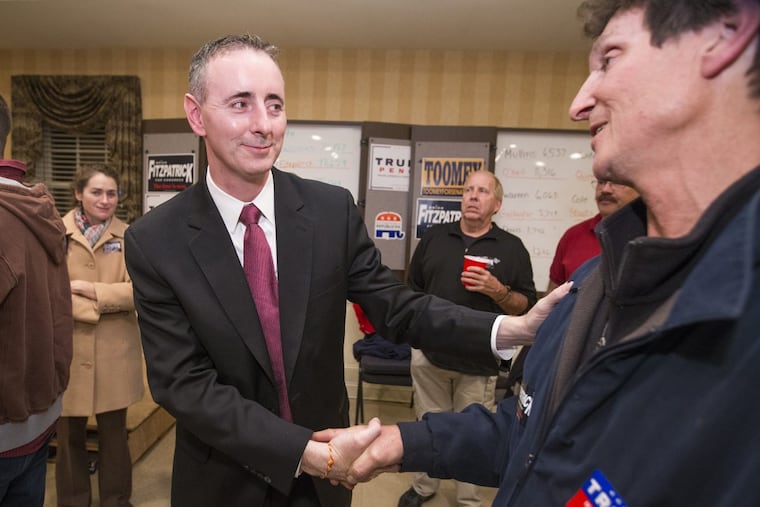This Republican is bucking his party in the fight over Pa.'s new congressional map
U.S. Rep. Brian Fitzpatrick, a Republican whose district is centered in Bucks County, said "gerrymandering attacks the bedrock right of every American to fair representation."

When Republicans took to federal court last week to block Pennsylvania's new congressional map, there was one person who didn't join the fight: U.S. Rep. Brian Fitzpatrick.
He is the only GOP congressman in the state running for reelection who did not put his name on the lawsuit.
Not that anyone would have known. Fitzpatrick, who represents Bucks County, put out no press releases about the news. His office also initially declined to answer questions about the issue.
In an interview Monday, which will likely displease both Republicans and Democrats, Fitzpatrick said he didn't sign on to the GOP's challenge because he believes elected officials should never draw congressional maps. That includes both "elected legislatures" and "elected judges," he said.
Instead, he wants an independent, nonpartisan panel of citizens to do the job.
"The process is broken," said Fitzpatrick. "Gerrymandering attacks the bedrock right of every American to fair representation."
In recent months, Democrats and Republicans in Pennsylvania have accused each other of drawing congressional district boundaries to their benefit. The state Supreme Court ruled in January that Pennsylvania's map, created by a GOP-dominated legislature, was unconstitutionally gerrymandered. The court, which is led by Democrats, drew a new map for the state last week.
Fitzpatrick characterized the court battle raging over the two maps as a disagreement over "whether elected legislatures should draw the lines or elected judges should draw the lines."
Both are wrong, he said. "I don't defend either map."
This isn't the first time that Fitzpatrick has bucked his party in the feud over Pennsylvania's congressional lines. In January, he didn't join a GOP amicus brief supporting state lawmakers who asked to stay the state Supreme Court's decision. He was the only Republican congressman in the state to sit it out.
He also signed on to a bipartisan amicus brief last fall that argued against partisan gerrymandering in the Wisconsin case Gill v. Whitford, which is currently before the U.S. Supreme Court. U.S. Rep. Brendan Boyle, a Pennsylvania Democrat, also signed on to it. "Extreme partisan gerrymandering is undemocratic, and cannot be reconciled with the Framers' idea of a House of Representatives that would be directly accountable to the people through competitive and broad-based elections," it reads.
Fitzpatrick said he became interested in gerrymandering while he was an agent for the FBI's political corruption unit.
"During the course of my career arresting politicians, I developed theories about the brokenness of the system," he said. "It boiled down to three essential things."
In Fitzpatrick's view, campaign fund-raising, the rarity of term limits, and gerrymandering are at the root of most of the government's problems.
On his first day in Congress, Fitzpatrick introduced legislation to overhaul the redistricting process by withholding certain federal funds from states that don't use citizen commissions to draw congressional maps.
"The only way to get back to a true citizen legislature with moderate representation and independent thinkers is to draw lines in a fair manner," he said. "And the only way to do that is to have an independent citizen commission that is nonpartisan."
Fitzpatrick has always represented a swing district, but under the new map, it becomes even more competitive. Donald Trump won Fitzpatrick's old Eighth District with 50.1 percent of the two-party vote in 2016. According to an analysis by Larry Sabato, director of the University of Virginia's Center for Politics, Fitzpatrick's new First District moves from "leans Republican" to a "toss-up."
Fitzpatrick said he has met several times with Fair Districts PA, a group that wants to amend the state constitution to establish an independent citizens' commission to draw congressional and state legislative maps. A majority of state House members has signed on to a bill to make the switch, and a state Senate hearing has been scheduled on similar legislation. Some of the supporters are Republicans.
Meanwhile, Fitzpatrick's anti-gerrymandering bill has gone nowhere in the U.S. House. But he's optimistic that could change.
"Now that the courts are intervening, I think both sides are getting nervous," he said. "I think people on both sides are looking at our idea."